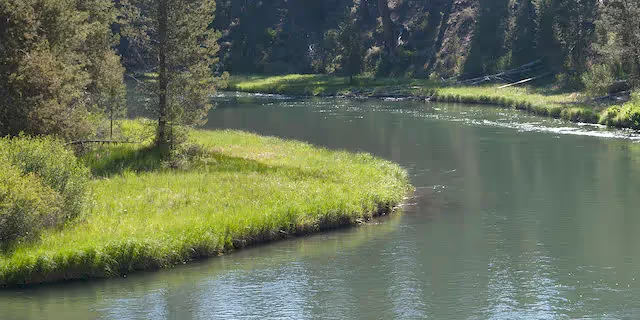Capital Press: Deschutes ‘water bank’ intended to ease water leases

Irrigators could borrow and lend water through a centralized “water bank” in Oregon’s Deschutes Basin under legislation headed for a vote before a key budget committee.
Supporters of House Bill 3806 say the mechanism, which would be new to state water law, is meant to move water around more efficiently in the drought-stricken region.
The concept builds on existing transactions, such as leases of unused irrigation water to increase in-stream flows, while reducing the red tape needed to manage them, according to proponents.
“The bank would really expand on those tools and lets us scale up the work to meet the challenges in front of us,” said Kate Fitzpatrick, executive director of the Deschutes River Conservancy nonprofit.
Under HB 3806, irrigators and other water users could deposit water into the bank, making it available for other uses, usually on a temporary basis.
That way, the bill would allow farmers and cities to more easily buy water through the bank from others who didn’t require their full seasonal allotment.
“This is a local solution based on local needs, hydrology and geography,” Fitzpatrick said during a legislative hearing on the proposal. “It’s all voluntary and we’re looking for flexibility.”
The bank would cut down on bureaucracy by consolidating such transactions for regulatory clearance, sparing irrigators and others from individually submitting every agreement for approval, she said.
“You’re trying to package these things up for streamlining,” Fitzpatrick said.
An operating plan describing planned transactions would be submitted annually by the Deschutes River Conservancy to the Oregon Water Resources Department, which could terminate those found to injure other water rights or violate other rules.
The nonprofit would also be charged with measuring water rights that are split among users and submitting that information to agency watermasters, among other provisions.
When irrigators fallow their fields to loan water to the bank, 25% must be dedicated to boosting in-stream flows to help fish habitat.
Only water users within the Deschutes basin would be allowed to conduct transactions through the water bank, which is meant to guard against outside investors speculating in water rights — a prime concern that’s been raised about the idea, Fitzpatrick said.
“That’s not what we’re doing in the Deschutes,” she said. “This is a locally-controlled water bank.”
The water bank would operate as a pilot project, with the enabling legislation expiring in 2034, but if the concept is successful, supporters anticipate it could be used by other basins in the state.
“This is the best basin to start this process to gain confidence among the stakeholders, then hopefully we can move forward at a statewide programmatic level when the basins are ready,” said Rep. Mark Owens, R-Crane, a chief co-sponsor of HB 3806.
The House Agriculture Committee voted 7-2 in favor of the proposal last month, but the bill must now win the approval of the budget-setting Joint Committee on Ways and Means, which is scheduled to vote on it on May 29.
The Legislative Fiscal Office recently determined that state government revenues will be $173.5 million lower in the current biennium and $374 million lower in the next biennium compared to its previous quarterly forecast.
The decreased revenue forecast is expected to subject spending bills to more scrutiny as the 2025 legislative session draws to a close. However, HB 3806’s fiscal impact is anticipated to be “very low,” said Rep. Ken Helm, D-Beaverton, the bill’s other chief co-sponsor.
The Oregon Water Resources Department is expected to need about $216,400 to establish and run the pilot project in the next biennium, which would rise to about $288,000 in the following biennium, according to the Legislative Fiscal Office.


